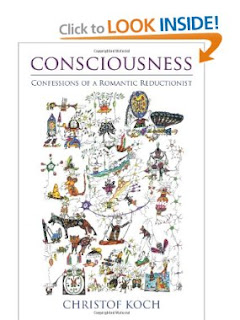Consciousness: Confessions of a Romantic Reductionist by Christof Koch (Author). What links acutely aware experience of pain, joy, colour, and smell to bioelectrical activity in the brain? How can anything bodily give rise to nonphysical, subjective, conscious states? Christof Koch has devoted a lot of his career to bridging the seemingly unbridgeable gap between the physics of the mind and phenomenal experience. This partaking e book--half scientific overview, part memoir, half futurist speculation--describes Koch's seek for an empirical clarification for consciousness. Koch recounts not solely the beginning of the modern science of consciousness but additionally the subterranean motivation for his quest--his instinctual (if "romantic") belief that life is meaningful.
Koch describes his own groundbreaking work with Francis Crick within the Nineties and 2000s and the gradual emergence of consciousness (once thought of a "fringe" subject) as an official subject for scientific investigation. Current at this paradigm shift had been Koch and a handful of colleagues, including Ned Block, David Chalmers, Stanislas Dehaene, Giulio Tononi, Wolf Singer, and others. Aiding and abetting it were new methods to pay attention to the activity of individual nerve cells, medical research, and brain-imaging applied sciences that allowed protected and non invasive research of the human mind in action.
Koch provides us tales from the entrance lines of modern research into the neurobiology of consciousness as well as his personal reflections on a variety of topics, including the distinction between consideration and consciousness, the unconscious, how neurons reply to Homer Simpson, the physics and biology of free will, dogs, Der Ring des Nibelungen, sentient machines, the lack of his perception in a personal God, and sadness. All of them are signposts in the pursuit of his life's work--to uncover the roots of consciousness.
Glorious and very readable overview of Koch's seminal work on making the research of consciousness more scientific, with the assistance of Francis Crick. They have been good buddies, and he speaks of him often in this book. Koch asserts a neo-panpsychist view (that there's some consciousness in every part, even when solely a tiny amount), which I agree with, but have not found too many others who do. He also explains the Giulio Tononi's theory on tips on how to measure conscious quantitatively (sees Tononi's e-book, Phi), by determining the quantities of integration and differentiation in a system. This opens the door to all sorts of fascinating non-dwelling things being thought of conscious. The guide contains many interesting tidbits on free will, the position of the unconscious, and which elements of the mind are most vital for the type of consciousness you and I have after we are awake. He reveals points of his private life to explain the path by which he has come to the discoveries and conclusions he has made, and in addition to remind the reader he's human: "Despite the bombastic ending, nothing in my book must be construed as taking me or my life too critically," he writes on the end of the top notes. This e book is effectively price studying if you are in any respect excited by consciousness and brains.
Consciousness: Confessions of a Romantic Reductionist
Christof Koch (Author)
200 pages
The MIT Press; 1 edition (March 9, 2012)

No comments:
Post a Comment